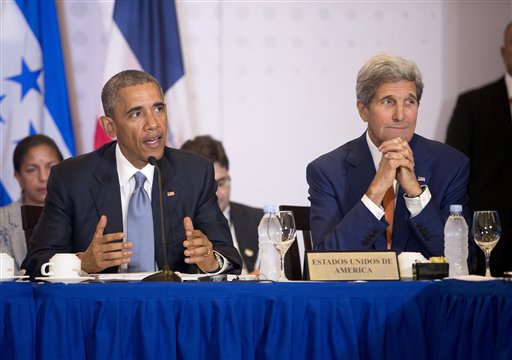Stage being set for historic Obama-Castro meeting Saturday

President Barack Obama, accompanied by Secretary of State John Kerry speaks during a multi-lateral meeting with Central American Integration System (SICA) Presidents, Friday, April 10, 2015, in Panama City, Panama. Obama is in Panama to attend the VII Summit of the Americas. AP
PANAMA CITY — President Barack Obama and Cuban President Raul Castro moved toward a groundbreaking meeting on the sidelines of the Summit of the Americas Friday in what would be a remarkable display of reconciliation between two nations with the leadership of the Western Hemisphere gathered around them.
The powerful symbolism of a face-to-face exchange Saturday between the two leaders could signal progress even though both sides are still working through nettlesome issues that would lead to the opening of embassies in Washington and Havana, the first stage in a new diplomatic relationship.
“The two leaders will be able to address and take stock in any discussion they have over where we are in the process of normalization, where we are in the discussions around the establishment of embassies and where we continue to have differences,” White House deputy national security adviser Benjamin Rhodes said.
The White House was coy over the status of the State Department’s recommendation to remove Cuba from the U.S. list of state sponsors of terror. Removal is a top issue with Castro because it would not only eliminate Cuba’s status as a pariah, but also ease Cuba’s ability to conduct simple financial transactions.
Nevertheless, the pace of activity over the terror list suggested that even if Obama did not make an announcement Saturday, one would come soon.
Article continues after this advertisementIndeed, the U.S.-Cuban outreach has entered a new, accelerated stage in recent days, with Obama speaking with Castro by phone Wednesday and U.S. Secretary of State John Kerry holding a lengthy meeting with Cuban Foreign Minister Bruno Rodriguez late Thursday.
Article continues after this advertisementThe Cubans also put an optimistic face on the developments. The Cuban foreign ministry issued a brief account of the Kerry-Rodriguez meeting, saying that for nearly three hours they discussed the reestablishment of diplomatic relations and the opening of embassies in a “respectful and constructive atmosphere.”
“Both parties agreed to continue discussing other matters,” the ministry said.
It was the highest-level, face-to-face contact between officials from the two countries since the Dec. 17 announcement that Washington and Havana would move to restore diplomatic relations that were severed in 1961.
Even as Washington talked up the historic shift toward Cuba, leftist leaders in Latin America took shots at Washington in solidarity with Venezuela.
Barely off the plane, President Nicolas Maduro of Venezuela laid a wreath at a monument to victims of the U.S. invasion of Panama in 1989. To shouts of “Maduro, stick it to the Yankee,” he vowed to personally ask Obama to apologize to Panama and compensate victims of what he called a “massacre” that left more than 500 people dead during the invasion.
“Never again a U.S. invasion in Latin America,” Maduro said.
President Evo Morales of Bolivia said he backs Maduro’s drive to end U.S. intervention in the region.
For Obama and Castro, their conversation Wednesday was the first since they spoke Dec. 17.
The flurry of diplomacy ahead of and around the seventh Summit of the Americas was recognition of the historic nature of the new relationship, one intended to end five decades of American presidents either isolating or working to overthrow Fidel Castro’s government. Officials were hoping to make the most of the exchange between the two men.
Obama was already getting praise from allies in the Americas.
“President Obama is going to leave a legacy the way he is supporting Hispanics in the United States, and also his new policy for Cuba for us is very important,” Panamanian President Juan Carlos Varela said as he met with Obama.
Removing Cuba from the list of state sponsors of terror would be a major milestone and likely generate controversy in the U.S., given the political repercussions of any Cuba opening. The sensitivities over Cuba are especially acute in Florida, a key presidential battleground, and they are likely to ignite vigorous debate among the presidential candidates.
Congress would have 45 days from the day Obama removes Cuba from the list to issue a resolution of disapproval, but the margin of passage would have to be veto proof.
Rep. Jeff Duncan, the chairman of a House panel on the Western Hemisphere, criticized taking Cuba off the list, saying a bipartisan coalition in Congress would demand that it first meet democratic, humanitarian and national security conditions.